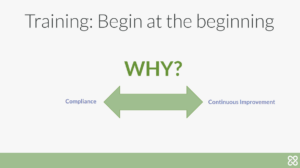Often part of leading assessment on campus requires training faculty and staff. While many of us have been instructors, we may not have led any kind of professional development or training for our colleagues. It can feel intimidating, but we have several tips to make sure your events are successful.
Training Basics
Just like every course session has an objective, so should your trainings. Thinking through this at the start will help you get organized and communicate the purpose to the attendees.
- WHY do they need to know this?
- What do they need to know?
- Who needs to know it?
- When do they need to know it?
- How can they learn it?
Articulating the WHY for yourself and faculty and staff is crucial, and also motivating. There may be some resistance to this work, but in reality, there is a lot of common ground. Faculty and staff care very much about their students, courses, and programs, and assessment supports those. While yes, assessment and accreditation do “check some boxes,” it’s much more. It is the opportunity to examine our programs and institutions and celebrate how amazing they are, and identify how they can become even better. It is a valuable process that allows members to showcase their successes and how they fulfill their commitments to students – something everyone can get behind.
Training Considerations
Once you have established the overall purpose, next you want to identify your training goals. Do you need to cover how the assessment process works?This would be considered more content training. Or are you instructing on a software platform?
Once you have established the goals, decide on some more tactical items so you will be able to create outlines and presentation materials:
Training Models: What works best for your audience based on your goal?
- Train-the-trainer: Sessions for department liaisons, they then go train their colleagues
- At-your-own-pace/Asynchronous: Accomplished through videos or guides faculty and staff can access anytime
- Group/Hands-on: Working sessions with worksheets or laptops
- All-at-once: Train on the entire process in a longer session
- As needed/Sequential: Train on parts of the process over several sessions
- Individual/1:1
Logistics and Session Details:
- WHO needs to attend, and WHO will present?
- WHAT will they do in a session for HOW long?
- WHERE and WHEN will the training be?
- HOW will you communicate about the training sessions?
Incentive Ideas for Attendees:
- Host an expert speaker
- Provide refreshments
- Have a campus leader/administrator speak at the session
- Invite your “champions” to present and train
- Secure additional pay or release time
- Schedule working sessions so people don’t feel this is “extra work”
- Encourage collaboration to reduce redundancy
General Tips:
- Make training and tasks digestible, doable, and interactive
- Consider partnering with your teaching and learning center
- Compliment and thank where appropriate
- Assess the training – conduct formal feedback, use it to improve, and share what you changed
Training Challenges & Solutions
Of course, things won’t always go smoothly. However, these can be opportunities to learn, collaborate, and improve.
- Resources (or lack of):
- Make a list of what you DO have, and work with that as best you can.
- Document what else you might need to do an even better job.
- Collaborate whenever possible to share resources.
- Resistance:
- Explain the value, process, and reasonable expectations.
- Use whatever incentives you can.
- Consider meeting new faculty during orientation – introduce yourself and share some resources early in their journey.
- Being “stuck in the middle”:
- Plan to involve colleagues from all levels – deans, department heads, faculty, directors, staff, administrative assistants, even students.
- Encourage collaboration to ensure everyone shares the same goals and shares the work.
- No previous experience being a trainer:
- Search the web, ask colleagues, and have a good plan.
Partner with areas who do training and professional development - Remember, assessment is an iterative process, and so is how you lead your campus in it. Communicating common goals, getting organized, and asking for help will ensure your training is successful!
- Search the web, ask colleagues, and have a good plan.
Additional Resources




